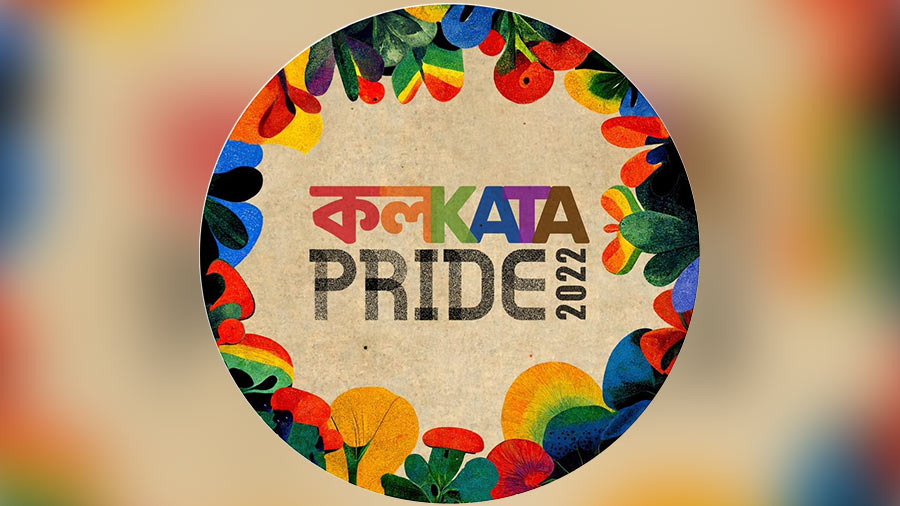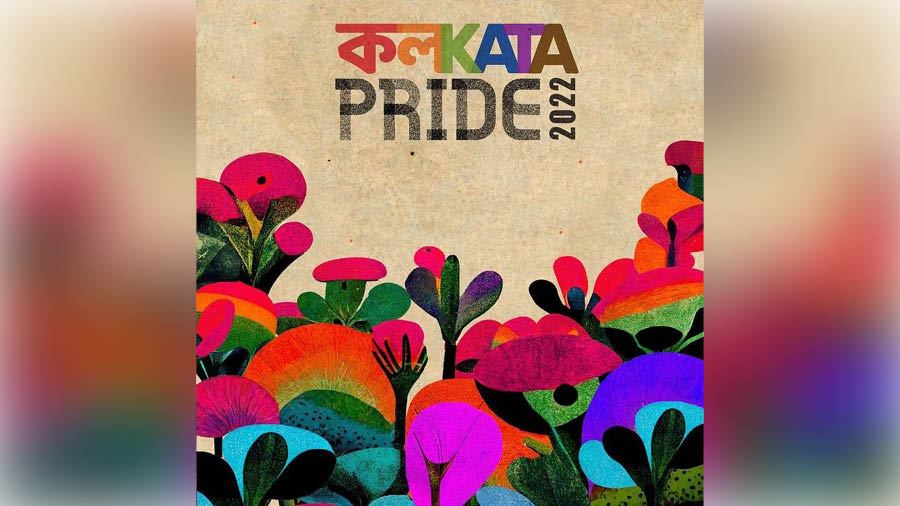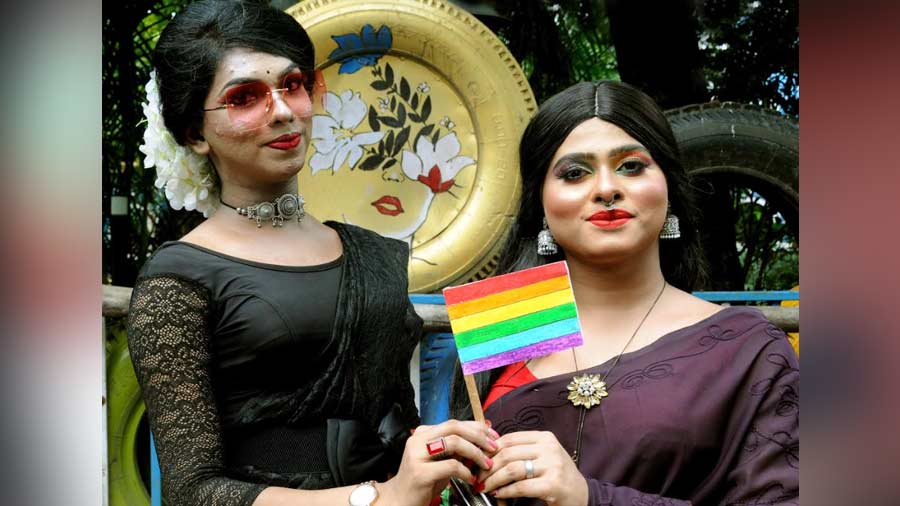This is a letter written to those footsteps that play the streets of my city for a day every year and make music. The music is one of rebellion and revolution, of protest and pride. And the letter is one of gratitude. I first heard of the Kolkata Pride Walk from our gender studies professor during my university days in 2015. He had mentioned it in passing during a class on queer movement as if it wasn’t the most unusual thing that what I had been seeing in films and on TV happened in my city as well — my city where my friend had confessed to me that he would rather get married than come out of the closet, where adult men in buses go stiff as boards when a hijra stands in front of them, where growing up, Rituparno was a film maker on TV but a slur at school.
Of course, this was only my city and not that of every Kolkatan. A space can very well be empty but places are inevitably filled with other places. A city like Kolkata is made up of thousands of cities — all too unaware of each other’s sounds and colours, bends and crossroads, pace, smells and pollution levels. Every day, such completely invisible cities have awkward encounters, held in the gaps between the highrises and the tin shacks across the street, the reserved and the general section of the bus, the customer and the delivery person outside the door. Alien cities sit together at night in front of the same dining table, or exist inside the same messaging app, the distance between them measured by the angles of restless thumbs on screens.
On a sunny December afternoon of 2015, I walked from my third-floor apartment in north Kolkata to Deshbandhu Park at Shyambazar and met a new city for the first time. By then, I had moved into a Kolkata where English was the lingua-franca, politics the raison d’etre and knowledge the universal currency. Gender studies and social media had already made me versatile in the colours of the rainbow and the letters of the LGBTQIA+. I knew that marking the people in front of me based on their facial features would be like assuming the food in our pantry based on their containers. Yes, sometimes, the little Nescafé glass bottles will have coffee and clarified butter will pour out from the plastic Jharna ghee containers, but that hardly means one should stuff their mouth with the powder in the Horlicks jar without asking first or steal the pickle jar to their room without checking the inside of it. God is my mother in the kitchen and we are all her spices. And so, with the humility learned only through experience, I stood back from assumption, and with the nervousness of a new guest at a party, scanned the crowd for familiar faces.

In the last seven years, I have made a handful of very good friends from the community, a community that never asked me whether I am one of them or an ally, where my presence as a friend was more important than the label I go by
On Sunday morning, as I get ready for Park Circus Maidan, the place that hosted the first Pride walk of this country back in 1999, I know I won’t have to look too hard for a familiar face. In the last seven years, I have made a handful of very good friends from the community, a community that never asked me whether I am one of them or an ally, where my presence as a friend was more important than the label I go by.
“Can you go to the Pride walk if you aren’t queer?” I had asked my professor one day during class. “Everyone is welcome there. It is a celebration of difference, Sagnik. We don’t believe in gatekeeping, at least most of us don’t. Just make sure you are not hogging the space.”
It took me years to realise what he had meant by that. How all the spaces that I had left — the nooks and crannies of my childhood, the boredom of my boyhood room with its windows shut against the colours of the sky, the alley beside our house, too narrow for people to pass through — were all there for me to get back to if I chose. I could walk on a march under the shade of the rainbow and go back to the white sheets of my bed under the roof where I was raised. The Kolkata that I chose to leave did not throw me out whereas there are people in this march who are not allowed to walk this city at all except this one day, who have claimed their right to walk even this one day through jeers, tears and blood.
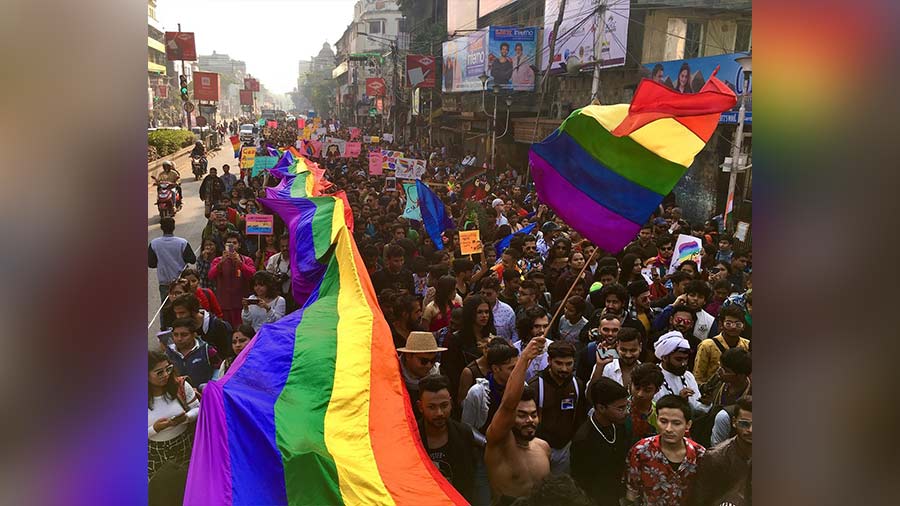
A scene from the Kolkata Pride Walk, 2019 @KolkataPride/Facebook
There were 15 attendees in the first Pride walk. There was no music and no flag. Dubbed “The Friendship Walk” to avoid hostility from the conservative sections of the city, the 15 people of the rainbow had come from all over the country to celebrate Liberation Day on the streets of a city they found safer than the other metros, a city where protests and revolutions have had a long history. In 2003, four years after the first Kolkata Pride Walk, the attendees were 50 and it would be a while before this walk would spread to other cities of this country.
Today, there are complaints from the veterans about the Kolkata Pride Walk becoming less of a political march and more of a festival. While there may be something to that accusation, I feel the celebration itself would be protest enough without even a single banner. In 2015, as I stood in front of a city, ready to walk the streets under the weight of hushed voices and curious gaze, I remember being disarmed by such a vista of colours and music. I remember feeling sad about how underdressed I was, wearing my favourite green shirt, pinned with a little rainbow badge that a few of us from college had made the day before with our professor.
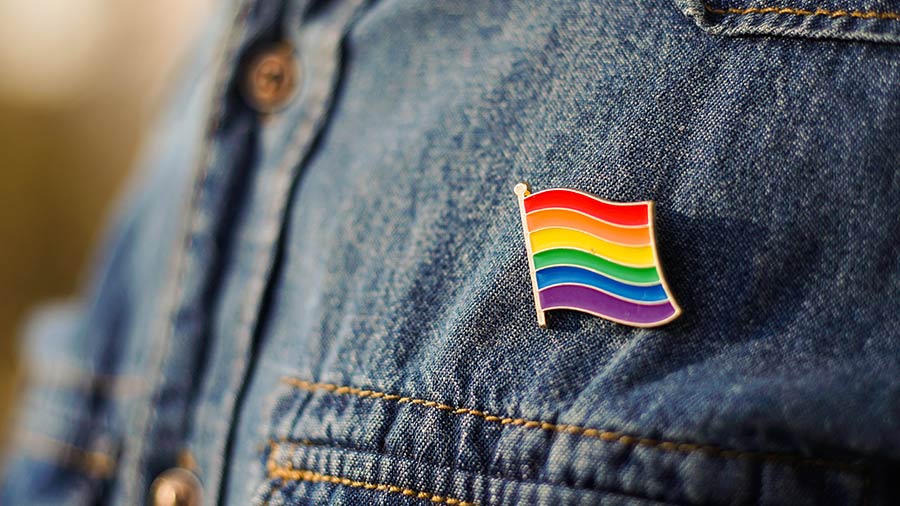
Shutterstock
Not that there weren’t people in work clothes or casual wear, but that it did not occur to me that dressing up could be allowed on a march. Watching the beautiful people in front of me in dresses, laces and synthetic feathers, with kohl around their eyes and colour on their lips, I felt a pang of jealousy and excitement together. We never cared about fancy clothes in our house, no one in my mother’s family wore kohl, lipstick or ever painted their nails. Fashion and makeup were unnecessary entrapments for the shallow heart and the idle mind. For most of my teenage years, I had subscribed to that belief, pushing away my awkward, fat, puberty-ridden body at the very back of myself and forgetting that little boy who would spend summer afternoons with his cousin sister, letting her paint his nails; who would casually put his mother’s velvet bindi on his sleeping father’s forehead; who would spend hours by the mirror, playing make-believe with his reflection which looked back without shame.
Shame is the opposite of pride. It is the dust gathered from childhood that you cannot seem to shake off. On a sunny day, it is the sand in your shoe; on a bad one, it is the soot on your face and the dirt in your eye. Shame has clung to my body for almost 19 years now though at each year’s Pride walk, I see a little of it being left on our trail, falling to the ground somewhere between the shouts for freedom and the dance of joy. Shame was nowhere to be found that December day in 2015 in the eyes of the people who were standing by my side with placards in hand, rhymes on tongue and a carnival inside their heart.

Shame is the opposite of pride. It is the dust gathered from childhood that you cannot seem to shake off. On a sunny day, it is the sand in your shoe; on a bad one, it is the soot on your face and the dirt in your eye
Hearts are always at the centre of change. The academic world of English literature taught me to question the trappings of gender and the structure of heteronormativity but it was hearts filled to the brim with care and dissent that placed themselves between my body and shame. It was shouting slogans at the top of my voice that made me forget how I wanted mine to be low and deep.
My years in college among my peers was less hostile, certainly less violent than school but it was hardly liberating. There, among people who were taught to take any discussions of gender seriously, I would talk about the lack of options and styles in men’s fashion while window shopping with my friends, comfortable in my distance from the young chest-thumping masculinity of sports and porn, I would gossip about celebrity crushes; compliment my classmates on a good-hair day; send heart emojis; sympathise with period cramps; and agree that ditching a film-date with your girlfriend over a football match seemed insulting. My friends would ask me for relationship advice, confide their crisis, love-tiffs and family politics to me, and remind me in passing how I am more of a woman than a man.
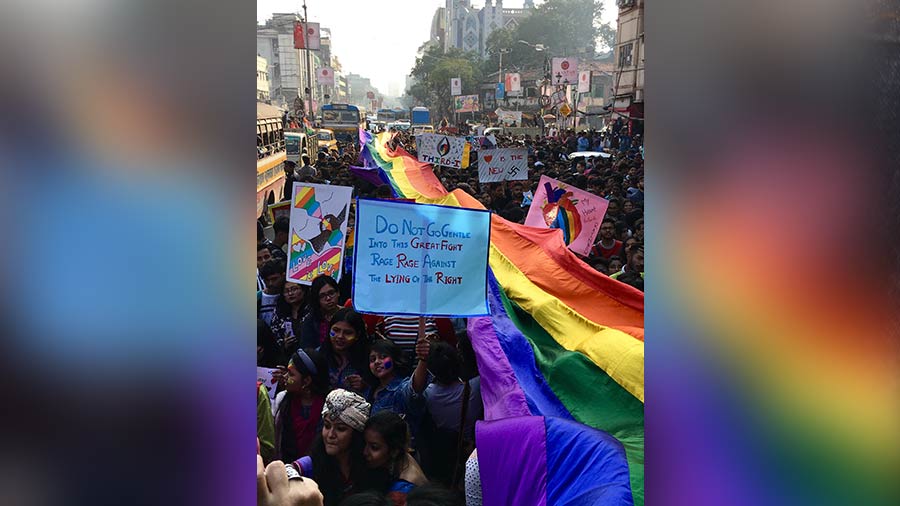
Another scene from the 2019 walk @KolkataPride/Facebook
I took that compliment awkwardly with the anxiety of a straight man losing his power and the gratitude of a youthful rebel being recognised as different and exceptional. Only later did it become clear that though we spend most of our lives in in-between places, being in-between people, we like to think in terms of opposites. Black and White. Day and Night. Summer and Winter. Food and Water. Cricket and Football. Man and Woman. Man and Child. Man and Nature. Man and Beast. Man and Not man. Man and Not enough man. Man and the Other men.
So, as I get ready for this year’s walk with strangers, friends and comrades, a walk where the city of rainbow enters my city and the cities I have left, here’s to all the other men in Kolkata — trans, gay, femme, and those who are constantly being misrecognised, who haven’t found a label, aren’t really looking for one, but who are tired of holding their breath all the time and folding away parts of themselves to fit into a one-size-fits-all gender.
Yours sincerely,
A Kolkatan
